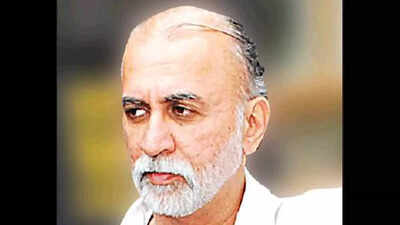
Tarun Tejpal
PANAJI: The high court of Bombay at Goa rejected a plea by Tehelka founder-editor Tarun Tejpal seeking in-camera hearings in the state’s appeal against his acquittal by a sessions court earlier this year.
Justices R M Dere and M S Jawalkar pronounced the verdict on Wednesday, after hearing Tejpal’s advocate, senior counsel Amit Desai, and solicitor general of India Tushar Mehta, representing the state. Desai said he would challenge the court’s verdict.
During the hearing, Mehta told the court that he wouldn’t name and shame the accused, and wouldn’t read out sensitive paragraphs.
He pointed out that the judgment was already in the public domain. Desai, on the other hand, said that the case has been heard in-camera right through the stages of bail, framing of charge and trial, and added that the appeal is a continuation of the proceedings.
Desai cited Section 327 of the Criminal Procedure Code and said that both the accused and survivor have the constitutional right to be protected. He added that open court proceedings would leave him afraid over who would be listening and who would be writing and publishing the proceedings. He pushed for protection of the privacy and reputation of the accused.
Desai also said that Tejpal has been acquitted by a very senior woman sessions judge, who delivered the verdict after a full trial, and added that this couldn’t be ignored. To this, advocate general Devidas Pangam pointed out that the sessions judge was very experienced (but) she named the survivor in the judgment.
Desai said that we don’t need the public participating in these proceedings, and don’t need to have publications on a daily basis to assist us.
Mehta, on the other hand, told the high court that Section 327 is not applicable to appellate proceedings, and stated that it is restricted to inquiry into and trying of an offence, and added that the trial stage ends at Section 353 of CrPC, when the judgment is pronounced in court.
He added that appeals are separate and distinct where there is no provision for in-camera hearing.
The moment the case reaches the Section 353 stage, the umbrella of Section 327 is over, he said, adding that there is no provision for in-camera hearings here.
Once the trial is over, the judgment and evidence is in public domain, he added.
Justices R M Dere and M S Jawalkar pronounced the verdict on Wednesday, after hearing Tejpal’s advocate, senior counsel Amit Desai, and solicitor general of India Tushar Mehta, representing the state. Desai said he would challenge the court’s verdict.
During the hearing, Mehta told the court that he wouldn’t name and shame the accused, and wouldn’t read out sensitive paragraphs.
He pointed out that the judgment was already in the public domain. Desai, on the other hand, said that the case has been heard in-camera right through the stages of bail, framing of charge and trial, and added that the appeal is a continuation of the proceedings.
Desai cited Section 327 of the Criminal Procedure Code and said that both the accused and survivor have the constitutional right to be protected. He added that open court proceedings would leave him afraid over who would be listening and who would be writing and publishing the proceedings. He pushed for protection of the privacy and reputation of the accused.
Desai also said that Tejpal has been acquitted by a very senior woman sessions judge, who delivered the verdict after a full trial, and added that this couldn’t be ignored. To this, advocate general Devidas Pangam pointed out that the sessions judge was very experienced (but) she named the survivor in the judgment.
Desai said that we don’t need the public participating in these proceedings, and don’t need to have publications on a daily basis to assist us.
Mehta, on the other hand, told the high court that Section 327 is not applicable to appellate proceedings, and stated that it is restricted to inquiry into and trying of an offence, and added that the trial stage ends at Section 353 of CrPC, when the judgment is pronounced in court.
He added that appeals are separate and distinct where there is no provision for in-camera hearing.
The moment the case reaches the Section 353 stage, the umbrella of Section 327 is over, he said, adding that there is no provision for in-camera hearings here.
Once the trial is over, the judgment and evidence is in public domain, he added.
FacebookTwitterLinkedinEMail
Start a Conversation
end of article
Quick Links
Delhi Air PollutionDelhi TemperatureChennai WeatherBangalore TemperatureCovid vaccination centres in DelhiCoronavirus in DelhiRTPCR test in GurgaonHyderabad RainPollution level in BangaloreDelhi SmogDelhi TemperatureNoida AQIGurgaon AQI todayFire in MumbaiMumbai RainsCovid 19 RT PCR Test in NoidaDelhi AQI todaySrinagar encounter

